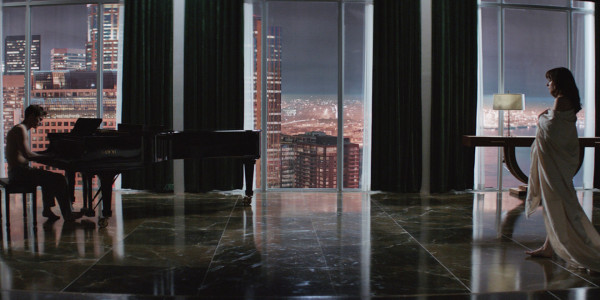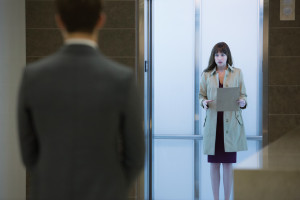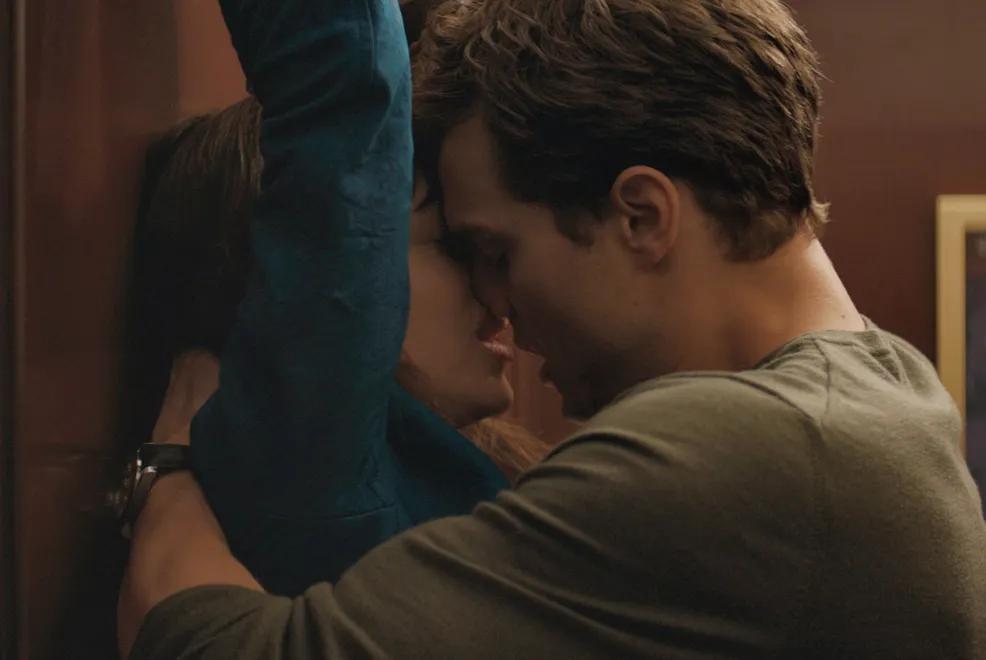
For a movie about some pretty kinky stuff, Sam Taylor-Johnson’s “Fifty Shades of Grey” is surprisingly hilarious. Some of this humor is intentional; in fact, in Taylor-Johnson’s take on E.L. James’s erotic sensation — about the relationship between a young student and a business mogul with a predilection for BDSM, jokes are cracked more often than whips. Unfortunately, a great deal of this humor is also entirely accidental. Crippled by a script chock full of dialogue so bad it’s downright laughable, “Fifty Shades of Grey” struggles to pass muster whenever its ramshackle plot calls for solemnity or pure unbridled sensuality. I don’t mean to suggest that “Grey” is a complete misfire. It’s not. But the film is, ultimately, most successful outside the confines of the bedroom rather than between the sheets, as one might expect.
Anastasia Steele (Dakota Johnson) is just another student. Quirky and quick-witted, Steele is studying English Literature and biding her time until graduation, when she agrees — on a whim — to conduct an interview with Grey Enterprises CEO, Christian Grey (Jamie Dornan), for a bedridden friend. Clumsily, Steele fumbles her way through the interview, but she charms the austere Grey, catching his critical eye. After the interview, Grey persuades Ana to grab coffee and then, in the midst of this impromptu date, sharply informs Ana that he cannot be connected with her.

Ana is only a smidge upset and seems ready to move on when she drunk-dials Grey, who quickly yields to his carnal urges and whisks her away to his posh Seattle suite. There, Grey reveals his deep dark secret and the source of his reservations: Grey maintains a penchant for sexual domination. Ana doesn’t seem too bothered, and after giving up her virginity to Christian, Ana becomes engaged in an ongoing relationship with the naughty prodigy. However, as Christian demands more of Ana, sexually speaking, Ana demands to know more about Christian’s self-proclaimed “singular tastes.” Unfortunately, Christian would much rather make pouty faces at Ana. Naturally, conflict and shenanigans ensue.
As sexual tensions rise between Ana and Christian, “Grey” begins to slip into parody. Dornan and Johnson have some pretty palpable chemistry, and until Christian and Ana get down and dirty, the spark between the two does a fine job of carrying the film’s flimsy narrative; when Christian coincidentally shows up at the hardware store where Ana works, for instance, Dornan and Johnson’s apparent rapport disguises how illogical and hammy the situation truly is. Once Christian and Ana go for a roll in the hay, however, this spark quickly fizzles out.
As Ana’s lover, the plot demands that Christian close himself off to his young paramour, and as a result, Dornan’s performance rapidly devolves into caricature. “Grey” wants us to believe that Christian can’t be completely honest with Ana because he’s “damaged” — some haphazard scars on his chest make sure that even the slow-witted pick up on that one — but without any real explanation as to the source of this devastation, Dornan’s lines just read like melodramatic trash. Dornan mutters something about crack, and starvation and hookers — and it all just seems so laughably shallow. Consequently, when Grey starts getting freaky in the bedroom, his lack of motivation pushes the film into the realm of absurdity bordering on parody. What’s supposed to read as arousing only truly succeeds in arousing laughter.

Fortunately, Dakota Johnson is in no need of Dornan’s assistance to keep the sinking film afloat. With superb comic timing — her days on Fox’s underrated “Ben and Kate” seem to have paid off well — and a self-awareness that manages to keep “Grey” from taking itself too seriously, Johnson is the glue that holds the film together. There’s a certain cognizance to the apparent naivety of Johnson’s Anastasia. Jumping in with the occasional zinger, or the often necessary eye-roll, Johnson ensures that Steele never appears to sacrifice her intelligence for Christian’s affection. In doing so, Johnson softens the film’s melodramatic tendencies and allows for a guiltless — and much needed — laugh every now and again.
“Fifty Shades of Grey” is actually not half bad. I might even go as far as to call it good, if it weren’t for a whole host of other problems. The film’s production design is shoddy at best, downright baffling at worst, and I found myself constantly wondering what exactly happened to the film’s reported 40 million dollar budget. Danny Elfman’s score is a load of garbage, hammering home every dramatic note with all the subtlety of an oncoming freight train. Seamus McGarvey’s cinematography is about as dull as it gets, leaning far too heavily on diffused lighting, so that the film’s aesthetic often resembles that of a Lifetime movie. Most egregiously misguided, however, is Kelly Marcel’s script. Marcel doesn’t seem to understand how real people talk and it’s no fault of the actors that a healthy chunk of lines seem pulled straight from the world of soap opera — after all, even Meryl Streep can’t turn water into wine.
Contact Will Ferrer at wferrer ‘at’ stanford.edu.
